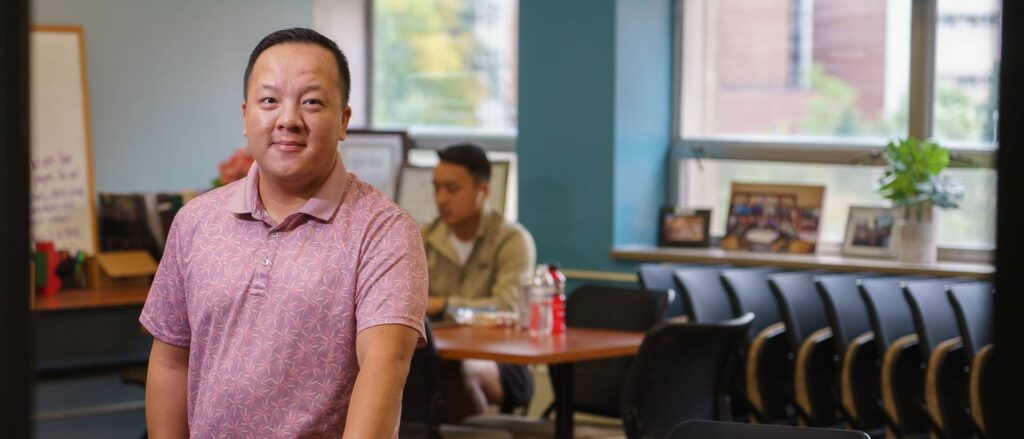
Dr. Kong Pheng Pha, an associate professor of critical Hmong studies and women’s, gender and sexuality studies at UW-Eau Claire, is a co-principal investigator on a $2.2 million National Science Foundation study. (Photo by Bill Hoepner)
A University of Wisconsin-Eau Claire faculty member and students will be involved in a $2.2 million National Science Foundation-funded study aimed at improving education outcomes for Hmong American students in the science, technology, engineering and mathematics fields.The multisite study with research bases at UW-Eau Claire, UW-Madison and UW Oshkosh will focus on increasing enrollment numbers and graduation rates for Hmong Americans in STEM majors who have struggled with their college experiences. The NSF grant runs through 2026.
“UW-Eau Claire has a lot of Hmong American students, and we have a strong culture of student-faculty research to do this kind of research,” says Dr. Kong Pheng Pha, an associate professor of critical Hmong studies and women’s, gender and sexuality studies at UW-Eau Claire, who is a co-principal investigator on the study. “I feel like we are in a strong position to carry out this work here. It’s important, it’s relevant and I’m really excited.”
The project is funded through the NSF’s Racial Equity in STEM Education program that supports research and projects that investigate how considerations of racial equality factor into STEM improvements.
The research expands on UW-Madison pilot research that examined the experiences of Hmong American undergraduate students at the flagship university.
Dr. Matthew Wolfgram, a researcher at UW-Madison’s Wisconsin Center for Education Research, is leading the study along with principal investigators Pha; Dr. Mai See Thao, director of Hmong Studies at UW Oshkosh; Dr. Stacey Lee, a UW-Madison School of Education professor; and Dr. Bailey Smolarek, an associate researcher at UW-Madison.
“We feel this is an opportunity to expand our work and take it more to the state beyond the flagship,” Wolfgram says. “We’re super excited about the opportunity to expand the opportunities and make it more relevant to the UW System at large. The Fox Valley and Chippewa Valley are major population centers in Wisconsin for Hmong Americans.”
“This is a really important project,” Pha says.
UW-Eau Claire is receiving $252,817 of the NSF grant, as up to three students a year will be involved in the research site at the university, including participating in designing the program. Students will be mentored, preparing them to conduct interviews with other Hmong students.
“We’re envisioning them to be very involved,” Pha says. “We will mentor them and look for their input. They will also be able to travel to conferences to present the findings and to be co-authors on future publications.”
The results of the study will help develop institutional practices and policies supporting more inclusive STEM education at UW System campuses. It also is intended to serve as the basis for similar studies in other groups of underrepresented and underserved students in STEM.
“We know that there are extreme disparities in higher education when it comes to race,” Pha says. “This study is part of addressing this problem in society. STEM has a lot of work to do to address racial justice and inequities.”
Written by Gary Johnson
Link to original story: https://www.uwec.edu/news/news/blugolds-part-of-nsf-study-on-hmong-stem-experiences-5460/
